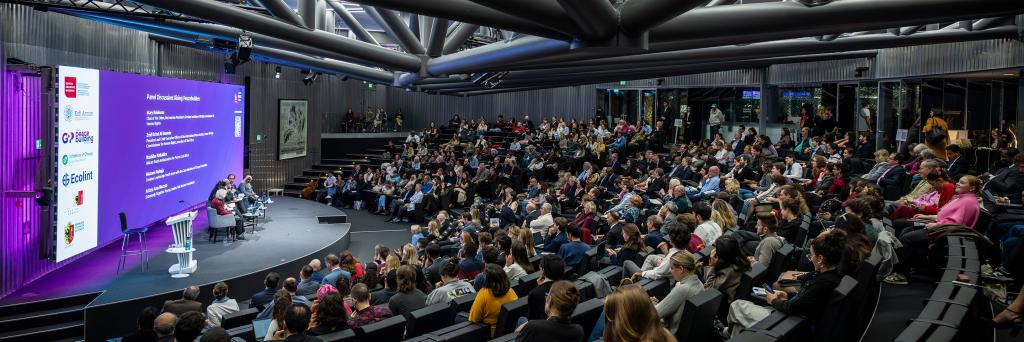Achim Wennmann, Director of Strategic Partnerships, Professor of Practice in the Interdisciplinary Programme and Nagulendran Chair in Peace Mediation at the Geneva Graduate Institute, made opening remarks calling on peacebuilders to rise to the occasion: “[Peacebuilders] need to rise, in the current day and age where the imagination of war and conflict is [part of] the everyday experience of those who are consuming news.”
The Kofi Annan Geneva Peace Address was organised with the support of the Republic and State of Geneva and the City of Geneva, and was further introduced by Marie Barbey-Chappuis, Member of the Executive Council of the City of Geneva, who remarked that “there has never been such need for a new perspective on peace, for new initiatives, and for radical changes.”
War is not politics by other means but represents catastrophic failure of political skill and imagination.
– Kofi Annan
In her keynote remarks, Mary Robinson paid tribute to Kofi Annan, her dearly missed friend and a fellow co-founding member of The Elders: “We feel the lack of his calm voice, his wisdom and moral authority more than ever in these troubled times.”
President Robinson focused on the state of war that is facing much of the planet, something which Kofi Annan would have considered a “catastrophic failure”: “It’s hard to speak of peace from the comfort and calm of Geneva when so many people around the world are suffering from the cruelties of conflict, from Gaza and Lebanon to Sudan, Ukraine, Myanmar, the Democratic Republic of Congo, and countless other wars that rarely if ever make it into our headlines.”
Indeed, Robinson shared Kofi Annan’s judgement and emphasised this state of failure that has already resulted in much war and is threatening to touch additional frontiers, not only geographically but within the framework of the international structures created following the second world war. She noted her fear “that as the United Nations is approaching its 80th birthday, the world is witnessing an alarming escalation of conflict and a steady erosion of the established norms underpinning international law. [...] If the International rule of law fails, we are all vulnerable to unchecked aggressions and violations of our fundamental rights…”
When addressing why such failure has spread across the globe, Mary Robinson shared what she deemed to be a very personal reflection to great applause: “I have come to believe that the heart of the problem is that the world has been run predominantly by male leaders.”
Gender equality was at the heart of President Robinson’s proposed approaches and solutions: “Gender equality is also highly relevant to peacemaking and peacebuilding. [...] It’s a grim but unavoidable fact that the decisions that most affect peace and security are primarily — and in some cases exclusively — made by men, often the same men who resorted to violence in the first place and initiated the conflict to begin with.”
While she claimed this as a personal statement, she shared two calls on the matter: that “the meaningful participation and inclusion of senior women in peacebuilding and peacemaking processes to be regarded as mandatory” and that the next UN Secretary General should be a woman.
Peace is a question of will. We cannot simply accept certain conflicts as unsolvable or acquiesce to the idea that military aggression offers a lasting solution, nor can we limit our efforts to managing the humanitarian impact from one cycle of violence to the next.
– Mary Robinson
To conclude her talk, Mary Robinson shared a final call from The Elders, for international leaders to focus on “long-view leadership”, meaning to show “the determination to resolve intractable problems, not just manage them”, as well as “the wisdom to make decisions based on scientific evidence and reason, and the humanity to listen to all those affected.” “Long-view leadership,” she explained, “must have the moral strength to address both current concerns and long term risks, taking on vested interests as necessary and prioritising a better future for humanity over short-term political gain.
The Kofi Annan Geneva Peace Address was followed by a panel discussion with Mary Robinson, Zeid Ra'ad Al Hussein, member of the Elders, President of the International Peace Institute, and former UN High Commissioner for Human Rights, and three exceptional young peacebuilders: Nashiba Nakabira, African Youth Ambassador for Peace at East Africa; Arizza Ann Nocum, Kofi Annan Changemaker for the Kofi Annan Foundation; Maruee Pahuja, Creative Leadership Youth Team at the Caux Initiatives of Change Foundation. Their discussion focused on community, the arts, education, and critical empathy, emphasising the importance of humanity at the heart of peacemaking.
Leaders ask yourselves why do you allow conflict, why do you wage war? Is it ego, power, money, faith, immortality? I hope you understand that while you achieve this, whatever it is, while you win, the rest of the world is losing. You have your bullets, you have your bombs, but for now and for many young people, I think it feels sometimes that our only weapon is hope, but sometimes that’s enough.
– Arizza Ann Nocum


